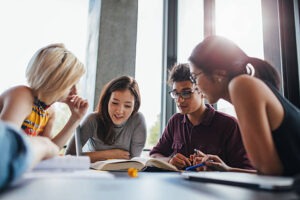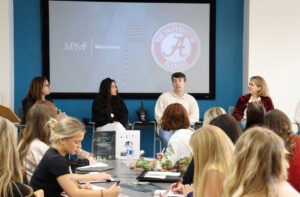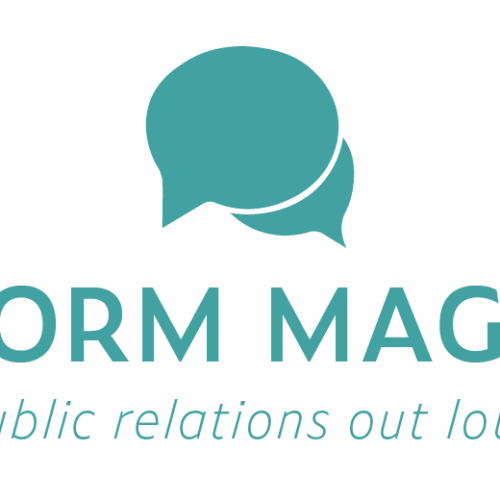Lessons That Last
Published on October 23, 2025 at 11:37 a.m.
by Addie Nails
In the field of public relations, anything can happen. A campaign can shift overnight, a client can change direction or a single social media post can spark a crisis—nothing is off limits.
That unpredictability is exactly why experiential learning is becoming an increasingly popular part of the learning experience. Alison Holcombe, experiential learning program manager at The University of Alabama College of Communication and Information Sciences (C&IS), explains that experiential learning opportunities prepare students to navigate the unexpected, build confidence and develop the skills they will need in their professional careers.
Defining experiential learning

Experiential learning is often miscategorized as an internship opportunity or a job. While these experiences are important, the concept encompasses much more.
A recent Forbes article outlines how hands-on learning can take many forms—from job shadowing and leadership simulations to community service projects and client collaborations. These examples illustrate that experiential learning isn’t limited to a select category of experiences.
Holcombe’s colleague, Randi Hamm, director of student engagement at C&IS, defines experiential learning as, “everything that happens outside of the classroom that ultimately comes together to help students be the total package to employers.”
Hamm’s explanation aligns with David A. Kolb’s Experiential Learning Theory, which emphasizes that students learn best through a cycle of experience, reflection and application. “This process not only builds professional skills but also makes a student well-rounded,” says Holcombe.
Professional development through experience
A strong resume may open doors, but in public relations, it is rarely enough on its own. The National Association of Colleges and Employers (NACE) reports that more than 90% of employers want to see candidates with work experience, and nearly half prefer that experience to be directly related to the field.
“In C&IS, we know that you’ve got to have more than just that degree, because all of our students ultimately go into very competitive industries,” Holcombe says. “Classroom learning builds the foundation, but employers want to see how students can apply that knowledge in real-world situations. That is where experiential learning sets students apart.”

C&IS offers countless opportunities for students to engage in experiential learning. Through Industry Immersion trips, students visit major companies across the country, gaining firsthand insight into career paths and building lasting professional connections. Students also can take learning beyond the classroom by joining organizations and experiences that involve managing real clients, developing strategic campaigns, mentoring peers and navigating fast-paced, unpredictable scenarios that mirror the professional world.
Matthew Wisla, a senior instructor at The University of Alabama (UA) with over 20 years of experience in the Public Relations industry and PRSSA Bateman Competition advisor, explains that Bateman offers, “a different experience than the classroom provides.”
The Bateman Competition is a national public relations case study competition hosted by the Public Relations Student Society of America (PRSSA). Student teams research, plan, implement and evaluate a full-scale campaign for a real client. The competition pushes students to think like professionals, requiring them to deliver measurable results under pressure rather than simply turning in assignments for a grade.
Wisla explains that the public relations industry is driven by results. Unlike in a classroom, where students might have multiple chances to improve their work, both the Bateman Competition and the PR field demand results. Students get one opportunity to meet client expectations. The competition also simulates the structure of an agency, requiring students to collaborate effectively, manage deadlines and maintain high performance over time. Wisla notes that the pressure and teamwork involved help students build the resilience and determination that professionals need to succeed in the industry.
Holcombe reflects on how much these opportunities have expanded in recent years, noting that students today have access to more robust and higher-caliber experiences than ever before.
Across the country, experiential learning is expanding rapidly as colleges incorporate project-based initiatives into their curricula. A recent compilation from Duke University’s Learning Innovation program highlights 17 case studies showing how institutions of all sizes—from community colleges to research universities—are using collaborative, project-based learning to build critical thinking, teamwork and real-world problem-solving skills.
This growth mirrors what employers. are demanding—graduates who can move beyond the classroom and step confidently into a competitive job market prepared to contribute on day one.
Personal growth beyond technical skills
Experiential learning not only equips students with professional skills but also sparks personal growth that can redefine their career paths. Holcombe explains that students often use experiential learning to figure out what they truly enjoy—or don’t—in their career paths.
Holcombe’s graduate assistant, Kat Stanek, offers a student perspective. Stanek has been a part of multiple experiential learning opportunities including Minerva, an on-campus communication firm that helps students develop strategic thinking and professional skills, and Industry Immersion trips. Beyond building technical skills, she explains that these experiences have given her confidence in professional settings.

“I have the confidence to know what I want and be purposeful in the job application process,” Stanek says.
UA alumna Maribeth McClenny, now a Senior Account Supervisor at Edelman, also echoes this sentiment. While at UA she was part of Capstone Agency, a student-run public relations firm where she worked in the media department learning to pitch stories, manage client accounts and deliver results for real-world clients.
As a member of the Public Relations Student Society of America (PRSSA) she gained valuable professional development experience. Combined with several internships these experiences propelled her to the top during the recruiting process and, as she describes, “brought her out of her shell.”
“They fully built me up and made me more excited to graduate and go into the real world because I was eager to apply all that knowledge,” McClenny says.
Experiential learning encourages growth and reflection no matter what form it takes. As Hamm notes, “The biggest impact comes from the personal growth students experience. Whether it’s studying abroad, stepping into a leadership position or completing an internship, you can’t walk away without having challenged yourself, evolved and grown.”
Research supports these personal outcomes. A study published in the “International Journal of Environmental Research and Public Health” found that participants in experiential learning programs reported growth in interpersonal skills, emotional development and self-awareness—benefits that extend far beyond technical expertise.
Experiential learning is a lifelong practice
While many students view experiential learning as something that happens only in college and in a classroom setting, it’s a lifelong practice with value that extends far beyond graduation. “A lot of people don’t realize it doesn’t stop. I don’t think it ever really does,”
Hamm says. “The reality is most people want more. They want to job hop, they want to grow, they want to make a bigger impact.”
That drive for more—whether it’s a new role, a promotion, or building something bigger—depends on the same skills developed through experiential learning. These lessons don’t end with a diploma; they become the habits that keep professionals competitive, resilient and ready for whatever comes next.




